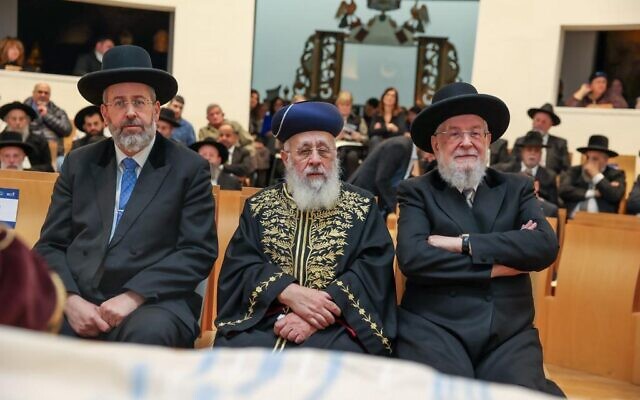DIN: I find it ironic that those who wouldn't even drink a glass of water with a Rabbanute Hashgacha, are all worked up over this. Just that you guys know, most of the food products recalled in Israel because of questionable kashrus are products under the Eida Hachreidis supervision, but you don't hear about it, it is kept "shaaa shtil" when the Rabbanute recalls a product they put advertisements in all the local newspapers, not to be "machshil" the oilom, but when you find out about an Eida product, you have to kasher your entire kitchen. How do I know? I shop in a very Chareidie Store that carries Eida Hachreidis products exclusively. Just last week I wanted to buy a certain product that my wife loves, I don't see it, I ask the Chareidie cashier "are we getting this product anytime soon?" He laughs and says "Yes, when the company makes it kosher"... there were no notices, no ads, they just pulled the product off the shelves. This has happened countless times! They are worried about women in the Rabbanute while feeding their families "chazir"
The High Court has ruled that women may serve on the committee that selects Chief Rabbis and the Chief Rabbinate Council.
According to the Times of Israel, the court ruled that the term “rabbi” applies not only to those ordained by the Orthodox Chief Rabbinate but to all individuals (including women), with knowledge of halacha comparable to the men. However the ruling does not allow women to be considered as rabbis themselves.
Under the ruling, passed by a panel of three justices with one dissenting opinion, women–whom the Rabbinate does not recognize as rabbis–may nonetheless be appointed to occupy the position of “rabbi” on the Chief Rabbi Election Assembly.
The ruling also allows women to serve on the Chief Rabbinate Council, a governing body of 10 rabbis who act as an arbitration body in all halacha and Rabbinate-related matters.
In the case of the electoral assembly, the court found, the purpose of rabbis is not to decide a matter of halacha, but to represent the religious community, as part of the decision-making process for the election of Chief Rabbi.
In his dissenting opinion, Justice David Mintz wrote that “the point of departure is that this court does not wear the hat of the Chief Rabbinate, which has the ultimate halachic authority.”
Shimon Shmueli, a lawyer and treasurer of the Bat Yam Religious Council – the office of the Chief Rabbinate in Bat Yam, slammed the decision on Twitter. He wrote: “Another aggressive intervention and distorted interpretation by the High Court of Justice. The letter of the law explicitly says, in clause 7(8), that the appointees are ‘rabbis.’ But they [the court justices] twist the lawbook whichever way they feel like.”
According to TOI:
“As per a 1980 law, the assembly is made up of two categories of representatives: “rabbis,” who are all men because the term has been treated as pertaining to the Orthodox definition that precludes women, and “public representatives,” who account for all females in the Assembly. In its petition, Bar-Ilan University’s Rackman Center argued that women should be allowed to serve in the Assembly not only in the “public representative” category — which accounts for 70 out of the 150 Assembly delegates — but also as “rabbis.”
The court concurred, saying that the roles should be open to women. It stopped short of decreeing that women be appointed as rabbis to the Assembly or the Council.”

I find it ironic that those who would rely on the Rabbanute Hashgacha, are NOT all worked up over this.
ReplyDeleteThis is a horrible interference into relgous affairs by an anti-religious group with dictatorial powers.
If the US Supreme court would interfere in how Muslim Imams are chosen I would consider it a terrible outrage as well